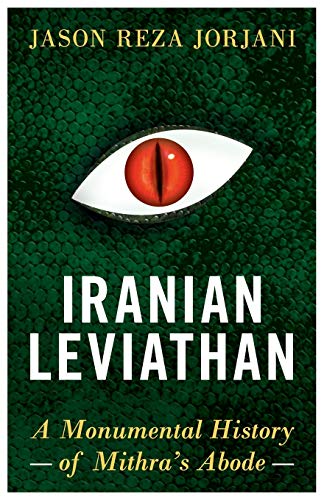Iranian Leviathan
A Monumental History of Mithra's Abode
Jason Reza Jorjani
BOOK REVIEW

In the boundless expanse of human knowledge, Iranian Leviathan: A Monumental History of Mithra's Abode by Jason Reza Jorjani emerges as a philosophical beacon, illuminating the enigmatic interplay between culture, religion, and identity. This is not simply a book; it's an odyssey that beckons you to dive into the depths of ancient Persian mysteries and reflects on how these echoes of the past continue to shape modern consciousness. Buckle up, because the journey to Mithra's abode is not for the faint of heart.
Jorjani, a philosopher steeped in the lore of his Iranian heritage, crafts a narrative that intertwines historical analysis with a piercing critique of contemporary narratives surrounding the Middle East. His work is a confluence of philosophical inquiry and historical exposition, as he delves into the rich tapestry of Mithraism-a religion that thrived long before many modern belief systems took root. Through Jorjani's lens, Mithraism is seen not just as a relic of the past, but as a vital element that influences sociopolitical dynamics today. His exploration feels like walking through the ruins of an ancient civilization, where every stone holds a story and every shadow whispers secrets.
One cannot help but feel a surge of anticipation when contemplating the implications of Jorjani's arguments. He invites you-no, he challenges you-to reassess the prevailing narratives about Iran and its place in history. As he unravels the complexities of Mithraism, you find yourself grappling with fundamental questions about fate, power, and the nature of human existence. This is where the magic of Iranian Leviathan lies; it transcends mere history to provoke a robust mental and emotional reckoning within the reader. It forces you to confront your assumptions, stripping bare the layers of ignorance that cloud our understanding of Iranian culture and spirituality.
Reader reactions to the book reflect a spectrum of emotions, from awe and exhilaration to bewilderment. Some hail it as a groundbreaking work that redefines our understanding of Eastern philosophy and culture, while others criticize Jorjani for what they perceive as an overreliance on speculative connections that might not hold in conventional historical discourse. This clash of perspectives imbues the book with an electric energy; it's a conversation starter, a provocative text that stirs debate. Critics query the depth of evidence in his assertions, wondering if Jorjani's interpretations carry the weight they claim. But isn't that the beauty of such a monumental piece? It ignites discussion and contemplation.
Furthermore, Jorjani's writing sparkles with unquenchable passion. He embodies the role of both scholar and storyteller, evoking visceral images that leap from the pages. When he discusses the cosmic battles of Mithras-where the god slays the bull in a symbolic act of creation and renewal-you feel it pulsing through your veins. This isn't dry academia; it's a vivid tapestry woven of myth, philosophy, and the raw essence of existence. Each chapter unveils layers of understanding, making you ponder how ancient narratives continue to resonate in our struggle against modern chaos.
Historically, Iranian Leviathan emerges during a time when the world finds itself polarized, grappling with the narratives that define nations and identities. In our current global climate, where oversimplifications threaten to drown out nuanced conversations, Jorjani's work stands as a clarion call to embrace the complexity of cultural heritage. He implores readers to take off blinders, to confront the uncomfortable realities of history and the ways they interlace with today's tumultuous geopolitical landscape.
What keeps the reader enthralled is not only the quest for knowledge but the emotional journey woven through the text. Jorjani forces us to ask: who are we, and what truths lay obscured beneath layers of dogma? He harnesses the power of ancient myths to resonate with our modern existential crises, suggesting that understanding our past may be the key to our future. The book doesn't merely recount history; it compels you to engage with it, to feel its implications echoing within your soul.
In a world laden with confusion, Iranian Leviathan is a beacon of hope and authenticity. It's a clarion call to those who dare to peel back the layers of mythology, to explore not just the "what" of history, but the "why." And let's face it: who wouldn't want to join a conversation that has the potential to change the way we perceive our collective human journey?
As you close the final chapter, you may find that Iranian Leviathan has not given you easy answers, but it has certainly equipped you with critical tools to navigate the labyrinth of understanding that is our cultural landscape. Every page lingers in the mind, pushing you to reflect on how history is not just a series of events but a living, breathing entity. Jorjani has achieved something significant-a work that saturates the reader with a thirst for knowledge that lingers long after the last words are read. It's not an escape; it's a resonant awakening. Are you ready to embrace it?
📖 Iranian Leviathan: A Monumental History of Mithra's Abode
✍ by Jason Reza Jorjani
🧾 582 pages
2019
#iranian #leviathan #monumental #history #mithras #abode #jason #reza #jorjani #JasonRezaJorjani